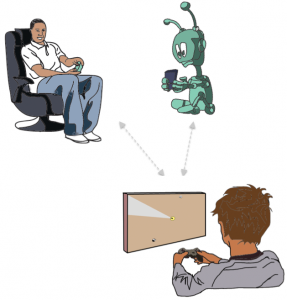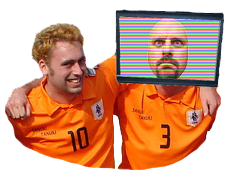Do we care about the feelings and emotions of virtual characters in video games? Do we feel guilty if we cheat a virtual team-mate?
Our findings suggest that there are biases of perception when interacting with computer team-mates. This leads to significant differences in behavior and memories of events.
Made popular by the research of Byron Reeves and Clifford Nass, there are many compelling examples of how people treat computers using social rules that they use for human social interaction. They carried out well known sociology experiments yet in their work, replaced one of the two human subjects with a computer. Surprisingly, the computers were treated as social actors! People were polite to computers, accepted flattery in much the same way as from humans, etc. They coined the acronym CASA for “Computers Are Social Actors,” and continue to demonstrate how people respond using social rules to computers and media–when people responded in similar ways to humans or computers, they called this a “Media Equation” result.
There is one catch, however, that is important to consider about these results. People in fact do not treat computers as they would other people. The “strong form” of the media equation requires that the actual responses are the same, yet in their studies, the results almost always support the “weak form” of the media equation, whereas summarized data and statistical differences are compared rather than direct comparisons.
Our research on direct comparisons has revealed that there in fact are differences in the perception, behaviors, and feelings when interacting with human compared to computer-based team-mates.
Related publications:
Merritt, T and McGee,K. Protecting artificial team-mates: more seems like less. In Proceedings of the 2012 ACM annual conference on Human Factors in Computing Systems (CHI ’12). ACM, New York, NY, USA, 2012. 2793-2802.
Kevin McGee, Timothy Merritt, and Christopher Ong. Understanding differences in enjoyment: playing games with human or AI team-mates. In Proceedings of 4th International Conference on Applied Human Factors and Ergonomics 2012. 446-451.
Merritt, T., A Failure of Imagination: How and Why People Respond Differently to Human and Computer Team-mates. PhD thesis, National University of Singapore, 2012.
Kevin McGee, Tim Merritt, and Christopher Ong. What we have here is a failure of companionship: communication in goal-oriented team-mate games. In Proceedings of OZCHI 2011, the 23rd Annual Conference of the Australian Computer-Human Interaction Special Interest Group: Design, 28 November – 2 December, 2011.
Merritt, T., Ong, C., Chuah,T. L., and McGee,K. Did you notice? Artificial team-mates take risks for players. In the proceedings of the 11th International Conference on Intelligent Virtual Agents (IVA2011). Springer, September 15-17, 2011.
Merritt, T., McGee, K., Chuah, T. L., Ong, C. 2011. Choosing human team-mates: perceived identity as a moderator of player preference and enjoyment. In the proceedings of the 2011 Foundations of Digital Games Conference (FDG2011). June 28-July 1, 2011.
Tim R. Merritt, Kian B. Tan, Christopher Ong, Aswin Thomas, Teong L. Chuah, Kevin McGee. Are artificial team-mates scapegoats in computer games? In Proceedings of the ACM 2011 conference on Computer supported cooperative work (CSCW2011), March 19-23, 2011. pp. 685-688.


